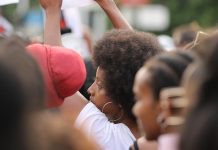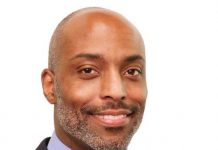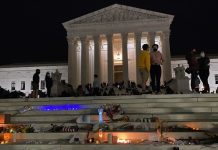Compiled by Lyn Collier, Tonya Harvey and Rob Schlegel
The recent decision by the U.S. Supreme Court to uphold the trans ban has affected all LGBTQ military serving the country. The Spectrum checked in with Las Vegas veterans to see how they felt on several issues. The stories we collected range from those who served in the Vietnam War to those who are in the military, today. Their opinions differ on current events but one thing they do have in common is their respect for the uniform and their country. Here are some of their reactions:
Major Morrison “Marvin” Carter, Ph.D.
USMC (Ret.) Former POW
1972 – 1986
As an LGBTQ military, do you think the recent court decision on banning transgender troops from serving openly is a step back to the Don’t Ask Don’t Tell era?
Sad, and yes, a step back.
How do you think this issue affects all LGBTQ military, not just transgender troops who serve?
Discrimination hurts everyone
Do you have a short story you can share with us about serving as LGBTQ military?
I was dismissed from the Marines, simply for acknowledging I was gay when I was interviewed by an investigator. I lost my career and all benefits, even with the discharge physical strongly recommending I get treatment for post traumatic stress disorder from the Veterans Affairs I was denied those benefits for over a quarter of a century.
Lastly, why did you feel compelled to serve your country?
I believe then and now that we need a strong military to defend the freedoms this country was founded on. (Editor’s note: Marvin Carter’s military service included many of the “alphabet soup,” top secret branches of the military. He currenntly runs a non-profi t, Helping Our Brothers and Sisters (HOBS), which assists former military, primarily with getting dishonorable service discharges upgraded.
Deja Wargo-Cole
Army National Guard
four years
As a LGBTQ military, do you think the recent court decision on banning transgender troops from serving openly is a step back to the Don’t Ask Don’t Tell era?
Absolutely. I am not concerned with how one of my fellow service members identifies. I am only concerned with their ability to do their job to the best of their ability and ensuring that their character reflects positively in whatever position they hold. At the end of the day, we are family. We protect one another. The recent decision to ban service members who identify as transgender is a form of betrayal that I feel cannot be justified. We as an organization have turned our backs on the very people who took an oath to lay their lives on the line for their brothers and sisters in arms.
How do you think this issue affects all LGBTQ military, not just transgender troops who serve?
This just proves that service members, who are not the heterosexual, cisgendered male majority that has historically dominated the military population are not safe, nor protected. I think this is an example of how we are merely “tolerated” and not “accepted” within the organization; how our leadership is only willing to say we’re allowed to serve because it looks good on paper. This also proves that equality has its limits as far as the military is concerned, and it is disheartening, because most of us swore to protect and defend our country because that is what we know and believe is right. To feel like we must protect and defend ourselves against our own is a huge slap in the face.
Do you have a short story you can share with us about serving as LGBTQ military?
My experience as being in the military and identifying as lesbian has been mostly positive within my own unit. However, I have had instances where heteronormative culture was especially apparent. A few months ago, I was standing in morning formation when my platoon sergeant went through his normal routine: Asking if there were any pay issues that needed to be brought to his attention, birth certificates, and he also asked for marriage certificates. I has recently gotten married, so I raised my hand and explained that I needed to meet with him to give him my marriage certificate. He then asked if I was going to change my last name, to which I explained that I was not (my wife and I agreed that we were not going to change our names). He then responded in utter disbelief, saying, “You’re not changing your last name?! What, is your husband taking your last name? Does he not have any balls?! What is this [expletive]?!” The entire company laughed, because most people knew that I was definitely not married to a man, and while the conversation ended there, it still bothers me to this day. Heteronormative culture and toxic masculinity is huge in the military, and everyone who does not conform to those standards rarely ever feels completely accepted.
Lastly, why do you feel compelled to serve your country?
I wanted to serve in the military because I grew up around my grandfather, who is retired Air Force. I always loved listening to his stories about when he served, and he always told me that he never wanted to leave. I saw his awards and his recognitions and ̵̶ even though I didn’t understand all of what they meant ̶ I knew they represented something significant and something that few people ever receive. I knew he had to have done something pretty special. I knew that I wanted to be just like him. Once I got older, I joined the Navy JROTC at my high school and excelled, becoming second in command in my organization and the Unarmed Drill Team commander my junior and senior year. I fell in love with the culture of the military even more. When I joined the Army back in 2015, I was in a very dark place in my life, and being part of something that was greater than myself made me fall in love with myself again. I was challenging the insecurities that I had and the emptiness I felt. I was pushing myself past my own adversities and I owe the military a great deal of credit for instilling a sense of passion in me that I lost. Regardless of the challenges that I face even now, and even in the military, I do what I do because I genuinely believe in and love this country. I also believe that I am capable of effectively fulfilling my obligations to the Army and excelling in what I do. I can only hope that one day, we as an organization will recognize that every service member regardless of race, ̶ gender, socioeconomic status, religion, etc. can serve and serve well. I will continue ̶ to speak out against discrimination in our military. We need to hold our leadership accountable when they say that their top priority is the well-being of its service members. We can no longer be satisfied with only “some” service members being truly protected and accepted in a space where we all contribute to the greater good. We are a culture. We are a family. We all deserve that right.
Sheila R. Hacco
Navy, Petty Officer 3rd Class (E-4)
four years
As a LGBTQ military, do you think the recent court decision on banning transgender troops from serving openly is a step back to the Don’t Ask Don’t Tell era?
Yes, it definitely does. I can understand some issues that may accrue but that should be dealt on an individual basis. There is no reason to label and restrict all transgender personal who want to join and are more than qualified to serve in the military. Seems pretty sad that this decision is taking us backwards.
How do you think this issue affects all LGBTQ military, not just transgender troops who serve?
Since we are all LGBTQ, it affects us all.
Do you have a short story you can share with us about serving as LGBTQ military?
Once I decided to enlist in the military, I was surprised to find out that there was a very specific question about homosexuality. I can’t remember the exact wording but it was something like: Have you ever engaged in a homosexual act? The recruiter brought up that this question will be in my paperwork to join. He said that if it was not on paper or documented anywhere to mark no. He said, if I mark yes, I would not be permitted to serve. This was just before Don’t Ask Don’t Tell. I marked no, but it took me a bit of time to do so, as I knew I was lying. I was pretty young and in the closet and figured I could get away from my life in Los Angeles as I was just not ready to come out. I’m laughing about this, because in my head, I knew that there seemed to be a lot of lesbians in the military. As predicted, there sure were a lot of us who lied about that question. I was so glad that such a question was taken away and later on, being LGBTQ was not a reason to deny or kick someone out of service. It sure is disappointing that such a ban can pass as we have come so far.
Q: Lastly, why did you feel compelled to serve your country?
Joining was a huge life-changing decision, which taught me so much. It taught me responsibility and attention to detail. I experienced so much, some good and some bad. I got to travel to so many interesting places and met interesting people, wherever I went. It showed me a way that I still apply in my life today. I can say, I came out a better person, and feel honored that I have had a chance to serve.
Nevada State Sen. David R. Parks
U.S. Air Force
1967-1971
As a LGBTQ military, do you think the recent court decision on banning transgender troops from serving openly is a step back to the Don’t Ask Don’t Tell era?
Transgender service members deserve the nation’s respect and gratitude. The Pentagon has always established core qualifi cation standards for its service members ̶ both for combat as well as for support duty. The Pentagon has determined that the 15,000 transgender service members are equally qualifi ed to perform duties in all categories of service to our country. The recent Supreme Court decision supporting President Donald Trump’s request to implement his discriminatory ban of military service by transgender service members places transgender service members under serious threat and puts their careers into question.
How do you think this issue affects all LGBTQ military, not just transgender troops who serve?
This action places the readiness of military units in question causing a ripple effect throughout the military including the thousands of units that rely on these highly trained service members.
Do you have a short story you can share with us about serving as LGBTQ military?
I served during the Vietnam War (1967-71). I found that while there was readily recognizable (but infrequent) incidences of homophobia within the ranks, there seemed to be far more military personnel who didn’t care whether you were gay or not, as long as you did your job and didn’t fl aunt your homosexuality. It was, for the most part, a live-and-letlive attitude.
Lastly, why did you feel compelled to serve your country?
In 1967, a month before receiving my bachelor’s degree from college, I was drafted into the military. While I was not a supporter of the Vietnam War, I was a proud American and felt obligated to serve and defend my country. (Editor’s note: Sen. Parks was the fi rst openly gay elected offi cial in Nevada.)
Frankie Perez, TSgt (E6)
Air Force
10 years
As an LGBTQ military, do you think the recent court decision on banning transgender troops from serving openly is a step back to the Don’t Ask Don’t Tell era?
I do believe this decision can lead us back to the DADT era/policy. This outcome will only lead to more discrimination, harassment and bullying throughout the DoD toward trans folks and possibly LGBQ people.
How do you think this issue affects all LGBTQ military, not just transgender troops who serve?
This is only teaching the younger generation to “other” transgender folks who have selfl essly volunteered to serve this country.
Do you have a short story you can share with us about serving as LGBTQ military?
I was at a training where we had to sleep in tents in the woods. There were female and male tents and latrines (bathrooms/ showers). I had just come out to my superiors in my unit but not to everyone in my squadron. I came out to the commandant and lieutenant colonel of the site and they were very supportive. We made a few minor adjustments regarding shower times and pronouns, and the mission continued as usual. The next day the unit that was inspecting us called me “sir,” used he/him pronouns, and it was some of the best feelings in the world! With communication and education, we made it work. No extra money spent or building new facilities. My unit knew ME. They appreciated and respected TSgt. Perez. The trans troops serving right now are carrying out missions that more than half of the population could never do because when we put on that uniform, it’s go time and nothing else matters.
Lastly, why did you feel compelled to serve your country?
I had the option to go back in as the rank I came out with, however, now I do not have that choice.To have someone take that away is one of the most dehumanizing and unethical things a person can do. Especially to completely capable people doing their jobs 365 days, seven days a week.
Claude F. Raffin
Lt. Col. U.S. Army,
retired, 20 years
As a LGBTQ military, do you think the recent court decision on banning transgender troops from serving openly is a step back to the Don’t Ask Don’t Tell era?
It is a step back and a shame, the color of your skin, your sexual orientation, gender expression or your religion, have no bearing on your ability.
How do you think this issue affects all LGBTQ military, not just
transgender troops who serve?
It’s a slippery path.
Do you have a short story you can share with us about serving as LGBTQ military?
Perhaps best titled, “A Funny Thing Happened on My Way to a Star.” I was slated to eventually get in the brigadier general command position but when I got back to the headquarters, the colonel position was suddenly not there and it was recommended that since I had only one year to go toward retirement, I should retire. I was then was placed in a dead-end job for a year.
Lastly, why did you feel compelled to serve your country?
In my days there was the draft, you either joined or were drafted. I joined the National Guard (homosexuals were not allowed to serve), eventually became a “gay” officer leading two lives. I volunteered for Vietnam, spent not quite two years there, came back and finally accepted myself for who I was, a gay person. I joined the Army Reserves, went back on active duty as a major. I retired as a lieutenant colonel from the Reserves, having served seven years active duty and 13 in the Reserves.
Reliance Sabol,
Nevada National Guard, Army, E4 / SPC / specialist,
five years.
< strong>As an LGBTQ military, do you think the recent court decision on banning transgender troops from serving openly is a step back to the Don’t Ask Don’t Tell era?
I don’t know if I would call it a step back but it is definitely not a step forward. Many people, however, may revert to their previous behavior during the DADT era of being more introverted so that they do not run into conflict and that’s also a problem. To me, I just view it as another obstacle. For many people within the LGBTQ community who currently serve, there have been many obstacles in the past but soldiers have continued to pursue their desire to serve and overcome those obstacles, while also fighting them at the same. time. (Hopefully) they may not be obstacles for younger generations who choose to serve. I know that I stand by this drive and will continue to push for the right of people who identify as trans to have the opportunity (to serve).
How do you think this issue affects all LGBTQ military, not just transgender troops who serve?
When people like myself have the opportunity to serve and others within my community are not allowed to, it’s hurtful and discouraging. I’ve spoken with others that I serve with who have chosen not to speak out about their sexuality publicly because even though it’s currently accepted, they still feel that it may go back to the DADT era. We haven’t quite moved completely forward so there is still fear within the troops because of this issue.
Do you have a short story you can share with us about serving as LGBTQ military?
Sure! Most people don’t even know it but I was actually recruited out of the LGBTQ Community Center downtown. I used to attend a meeting there that was called MPowerment for young males in the community to meet once a week and one week we had a guest speaker. That guest speaker ended up being an Army recruiter who was there to bridge the gap between the LGBTQ Community and the Army, once DADT was repealed. I wanted to do something more than just serve my community locally and two months later I was enlisted and scheduled to ship to basic training. After training, I was the fi rst openly proud gay male in my unit and that ended up encouraging a couple others to also be public about themselves because they saw that everyone still respected me the same.
Lastly, why do you feel compelled to serve your country?
Throughout the many years that I have served, I have never felt that I belonged to an organization more. It is said almost every month when we meet that, “We all wear the same uniform” and I know that my command believes that thoroughly. I have served openly as a homosexual since day one and I still have been awarded the opportunity to succeed at what I do many times which has been an amazing feeling
Nevada State Sen. Pat Spearman
Army, Lt. Col.
retired 29.5 years.
As a LGBTQ military, do you think the recent court decision on banning transgender troops from serving openly is a step back to the Don’t Ask Don’t Tell era?
Yes, I do. We should not deny anyone the opportunity to serve. This is an unconscionable homophobic policy.
How do you think this issue affects all LGBTQ military, not just transgender troops who serve?
It has a negative impact on morale and could endanger the lives of LGBTQ members of the military
Do you have a short story you can share with us about serving as LGBTQ military?
It was a constant vigil to ensure my career was not cut short if someone found out my secret. Always looking and wondering IF or WHEN I might be called to the commander’s office and questioned about my affectional orientation.
Lastly, why did you feel compelled to serve your country?
I loved serving in the military… honored to serve my country and to be a part of those who PROTECT AND DEFEND our Constitution, and the foundation pillars of our democracy.
John Waldron Ed.D,
US Army, Sergeant E5,
1983- 1987
As an LGBTQ military, do you think the recent court decision on banning transgender troops from serving openly is a step back to the Don’t Ask Don’t Tell era?
The decision by the Supreme Court to ban transgender military service is a step back to before the Don’t Ask Don’t Tell (DADT) era. Under DADT, gay men and women could continue to serve. The transgender ban allows the military to discharge the thousands of courageous and honorable members of the trans community currently serving in uniform. The decision is an unambiguous assault on the rights of the proud transgender soldiers who have chosen a noble career in military service. The fight presses on, and I am confident we will succeed in the end to protect the rights of the transgender community to serve our country.
How do you think this issue affects all LGBTQ military, not just transgender troops who serve?
The very idea of identifying as a member of the LGBTQ family means we are part of a coalition that is inclusive and supportive of one another. When one group within the LGBTQ coalition is under threat, we are all under threat. No members of our community are more stigmatized than our transgender family and friends. We should be outraged and standing side by side with the trans community to ensure all our rights and protections are solidified in all aspects of our lives. If we rest in any one area of the fight for equality, all aspects of equal rights can then be threatened.
Do you have a short story you can share with us about serving as LGBTQ military?
I served before Don’t Ask Don’t Tell, and all of us in the LGBTQ community who served at the time, had to remain quiet and, unfortunately, deny our authentic selves. It is a demoralizing existence when one is forced to deny who they are and who they love. Although I have known I am gay since a very young age, I had not openly expressed myself in any area of my life while I was serving.
Lastly, why do you feel compelled to serve our military?
I made the decision to enlist primarily because I needed structure and direction at that time of my life. I was young and struggling a bit. The military was a great avenue for me to develop discipline and to learn how to lead. Most importantly, I think there are few honors greater than having the opportunity to serve one’s country. And service to our country does not require enlistment in the military. There are myriad ways to demonstrate service as a citizen of the United States. Regardless of the chosen path, I think we all owe some measure of commitment in service to our fellow citizens.



























